Beechen's Batman Beyond
by aiwac
 [Warning: this essay contains
spoilers for Return of the Joker and the comic mini-series. Proceed at
your own risk]
[Warning: this essay contains
spoilers for Return of the Joker and the comic mini-series. Proceed at
your own risk]Let me start with a personal aside:
I am a huge fan of the world of Batman Beyond. From the very first couple of episodes, I was hooked. The original concepts and the interesting interpersonal relationships (especially between Bruce and Terry) fascinated me. If BTAS perfected the look and feel of a world that already existed, Batman Beyond created a new one almost from scratch. This world remains rich with potential for the development of new characters, storylines and concepts in the realm of Batman.
Best of all, this series produced Return of the Joker, one of the best Batman movies ever made (in my opinion) – either animated or live-action. The tight storyline, the usually pitch-perfect dialogue and the amazing acting kept me at the edge of my seat. The movie's ending perfectly encompassed the message of the second-generation Batman. If Mask of the Phantasm demonstrated Bruce's tragic fate to never be happy and content, RotJ completely upended that message with the reconciliation of Tim, Bruce and Barbara. It was the perfect show of what Batman Beyond could do to the world of Batman – changing its pessimistic direction while maintaining the core of heroism and justice – with just a touch of darkness and menace.
Needless to say, I was extremely excited when I heard that DC Comics would be producing a six issue mini-series on my favorite world. My excitement would not last long. Each new issue further sapped my enthusiasm for this project until it disappeared entirely. The stale, nonsensical plot, the grating mischaracterizations and the complete failure to create any kind of compelling atmosphere all crushed my hopes and optimism to dust.
I understand that all fictional worlds and stories, especially comic stories, are open to re-interpretation and renewed insight. Indeed, there are few comic characters who have received this treatment as often as Batman. I also realize that meeting the rather high expectations of the Batman Beyond fanbase, eager for a renewal of the franchise for years, was a daunting task.
However, this is no excuse for the poor-to-mediocre product I saw before me. It's one thing to reinvent matters, even if in my opinion they did not require reinvention so much as refinement. It's quite another to violate basic rules of storytelling. This is especially grating considering this series is a poor knock-off of RotJ, a masterpiece of storytelling (with some of Epilogue thrown in – though that episode was immensely better in dealing with the subject matter of cloning and identity). Put bluntly, what RotJ did right, this series got wrong.
To demonstrate this, I have listed three basic storytelling principles below. In each one, I will briefly explain the principle, then compare how RotJ and this mini-series pulled them off. Let's begin:
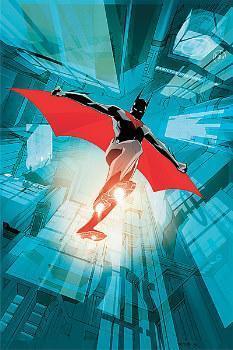 Dramatic Tension
Dramatic TensionThe pursuit of Harrison Ford in The Fugitive. The mystery of Kaiser Soze in The Usual Suspects. The cat-and-mouse game between Eastwood and Malkovich in In the Line of Fire.
What do all these movies have in common (besides all being made in the 1990s)? They all successfully maintained what is known as "dramatic tension" – that mixture of doubt, suspense and compelling storyline that keeps the reader or viewer at the edge of their seat. Properly done, a story with a good dose of this keeps us turning every page with excitement. While dramatic tension is not necessary for all genres, it fits perfectly with Batman stories, which are usually of the horror/action/suspense type.
Return of the Joker was a good example of dramatic tension done right. From the moment the Joker re-appears until the final showdown, we got a sense of just how much is at stake. His presence hovers over almost every scene, haunts every major character. Every action he takes is against people we know and care about. Even when the Joker begins his plan to annihilate Gotham City, he makes sure to openly declare that he'll kill everyone Terry cares about first. From beginning to end, we are desperate for this situation to somehow be resolved, even if we are unsure how that can happen.
Little of this tension is present in the comic mini-series. If the villain in RotJ and his actions is the center around which everything revolves, the villain of the mini-series is barely a side show. His actions barely register among the characters (except for Dr. Reid and Amanda Waller, but more on them later) except to serve as another part in a tedious chase from point A to B to C. We see little sign of the effects of his killing spree on either Terry or Bruce except to further fuel the artificial feud between them (more on that below). We see nothing to suggest that this is anything other than a routine hunt against an unusually physically adept killer.
Neither the villain's actions nor his identity contribute anything of value. He was a blood-thirsty brute as both "Hush" and a "Dick Grayson" clone. His eventual plan to sink all of Gotham City in a massive earthquake to kill super-villains makes no sense at all, especially since many of them are superhuman (Inque, for instance) and are capable of surviving a great deal. This is to say nothing of the fact that criminals – including the super-kind – tend to thrive on the kind of chaos and lawlessness created by natural disasters.
What's worse is that the story does little to augment our sense of dread at this. No flashbacks to the sight of post-No Man's Land Gotham City. No newscasts with innocent people looking on in horror at the possibility of impending doom. All we get is a quick, anemic description of the last earthquake by the real Dick Grayson. Dramatically, it's about as exciting as going to complain to the neighbors about the loud noise.
Which brings me to the next rule violated by this series:
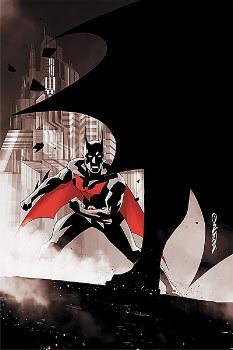 Characterization and Character Development
Characterization and Character DevelopmentAnyone, even people who are not literature majors or experts, can tell you that most good stories rest on the shoulders of their characters, especially the protagonists. If the characters are relatable, complex beings that act logically, then we can identify with them, feel their pain and hope for their success. If they have flaws or traumas, we wish them the best of luck in overcoming them, and if they can't, we mourn with them. Conversely, characters that are two-dimensional caricatures can suck the life out of a story and grate on the nerves, making every minute of reading or viewing into an unbearable chore. This can be the case even when the plot is well made, which it isn't here.
The writers of RotJ understood this. Their portrayal of the two protagonists is one of two people struggling with powerful doubts about each other, but who nevertheless care a great deal for one another. We see in the beginning of the movie that Bruce already has great faith in Terry by letting him operate without being monitored; his presence feels natural. When Bruce does snap at Terry (after trying soothing words of consolation) and tries to 'fire him', it is understandable and logical. The Joker was Batman's worst and deadliest foe. He had already ruined one partner of his. We can fully understand Bruce's motivation for what he did. For him, history can only repeat itself; it cannot be prevented or repaired.
The same goes with Terry. The heir to the cowl feels the opposite – unlike Bruce he is not out just to avenge his father but to redeem himself. Bruce believes history cannot be changed; Terry is compelled to believe the opposite or he is doomed. Now faced with the ultimate challenge and with everyone he knows in danger, Terry must stand up to both Bruce and the Joker and prove his point.
At the end of the movie, both protagonists have changed and evolved for the better. Bruce acknowledges Terry's worth as Batman and reconciles with Tim after years of shutting him out. Terry rests content that he was proven right in the end and that he is intrinsically worthy of being Batman. It is a natural, logical end to both men's struggles.
Now, to be fair, the comic series does not do everyone a disservice when it comes to characterization. Minor players like Dr. Reid, the new Catwoman and Amanda Waller are a joy to read; Waller's insane obsession with Batman and the new Catwoman's playful nature are of particular interest. I hope they will continue to make appearances in the ongoing series.
However, when it comes to the two protagonists, Bruce and Terry, this series could not possibly have missed the mark more had it aimed in the opposite direction. Bruce in particular suffers from a severe case of 'Miller'-itis: he is a cranky, egomaniacal jerk without a lick of empathy or compassion, much like the Batman of Frank Miller's later works. In RotJ, Bruce's doubts about Terry had to do with his possibly getting killed. They did not affect his sincere appreciation for Terry's dedication or his bravery. They do not affect the fact that he cares deeply for him.
In the series, Bruce treats Terry like dirt. He questions his dedication. He yells at him repeatedly. He builds robots to serve as his replacement. At one point he yells at him that he 'didn't do anything for him'. He even threatens to hit the suit's paralyzing fail-safe switch when Terry is fighting for his life against a homicidal villain. Not until close to the end of the story does he show anything resembling concern.
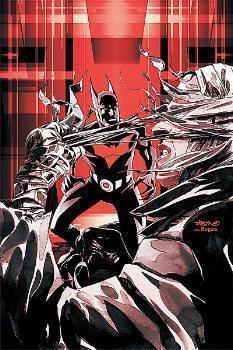 This is a complete 180-degree character shift from the Bruce at the end
of RotJ, which according to Adam Beechen is canon in this world. We are
given no reason whatsoever for it. It can't be because of the villain,
because Bruce was building the robots for a while. Nor was it because of
any particular failure on Terry's part, because there is no mention of
any such blunder. The attempt to redeem Bruce at the end by having him
give a 'good soldier' speech when Terry is badly wounded amounts to 'too
little, too late'. This is especially in light of his abominable
behavior towards Dick (more on that later). At the end he is barely back
at square one, supporting Terry – exactly where he should have been from
the outset.
This is a complete 180-degree character shift from the Bruce at the end
of RotJ, which according to Adam Beechen is canon in this world. We are
given no reason whatsoever for it. It can't be because of the villain,
because Bruce was building the robots for a while. Nor was it because of
any particular failure on Terry's part, because there is no mention of
any such blunder. The attempt to redeem Bruce at the end by having him
give a 'good soldier' speech when Terry is badly wounded amounts to 'too
little, too late'. This is especially in light of his abominable
behavior towards Dick (more on that later). At the end he is barely back
at square one, supporting Terry – exactly where he should have been from
the outset.Terry doesn't fare much better. He has morphed back into a neophyte who complains about his social life. He complains about his exhaustion constantly. The villain's words of derision seem to have an effect on him, even though the Joker tried the same tactic and hit a brick wall. He doesn't feel the like his more mature, experienced animated counterpart.
This is to say nothing of his poor skills. In the movie, it's made clear that Terry is a skilled fighter both in and out of uniform – he defeats Joker's Jokerz gang without the suit in the middle of the movie. Even his fight with the better-skilled Joker is far from one-sided. In the series, Terry is defeated, surprised and wounded repeatedly. Formerly capable of undercover work in the TV series, this Terry does the worst Mad Stan impression I've ever seen. A good arc would at least have him slowly improve until he finally bested his foe. Not in this series.
The same goes for Terry's development as a character. In the movie, we learn more about what motivates him to be Batman – the desire to atone for past sins. In the series, Terry is Batman just because. No juvie. No father. He's there just because it's great to be a hero and save people (does that necessitate being Batman specifically?). This is far from the depth one comes to expect from Batman characters and Terry specifically. At the end of the series he has learned nothing and gained nothing, a Teflon persona with no depth.
Which leaves us with the final blunder:
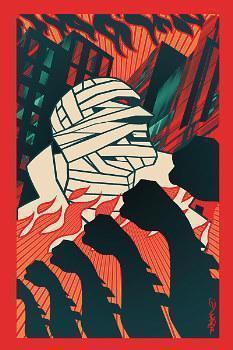 Central Plot Points
Central Plot PointsThe reason I called the series a poor knock-off of RotJ is because they both use the same idea – a killer brought to life by way of trauma to a former Robin. However, while RotJ uses this plot point to compelling effect, this series' attempt to replicate that effect falls flat in every conceivable way.
Why is this? What's the difference?
For me, the reason is simple. In RotJ, the Robin story made sense and served a purpose. Specifically, it provided an answer to the question Terry half asked in the beginning of the series – "Something happened to you, didn't it, and it wasn't just that you got old". In the movie we learn exactly what that "something" was – Bruce's failure to protect another young partner. The trauma of Tim informs the story just as much as Joker's presence, and only by ending that trauma do Bruce and Terry achieve redemption and absolution.
In the series, the trauma is manufactured, an artificial ploy that feels gratuitous and unnecessary. Even ignoring the fact that it couldn't happen in the timeline given (the Joker was already dead when he supposedly kidnapped Alfred), the story makes no sense and serves no purpose. Like Terry's and Bruce's sudden feud in this series, it is an artificial attempt to create tension and drama without a convincing rationale.
Let's start with the part with Dick getting shot. This scene leaves way too many unanswered questions: Why would Bruce let Nightwing anywhere near him after what happened to Tim and apparently Silver St. Cloud? Why would he make such a basic tactical error as jumping in front of him? Why, after having been visibly emotionally broken by Tim's ruination in RotJ, would Bruce up and abandon Dick after being so badly wounded?! Is he really that cold?
The argument that this was necessary for Cadmus to collect his memories and DNA makes no sense at all. In Epilogue there was no need for such methods and I see no reason for it here. Worse, the nature of this clone makes one think that deep down inside the cheerful Boy Wonder is a murderous psychopath hell-bent on revenge.
The only way this kind of plot could have worked is if the real Dick Grayson were shown to be better than this. This could have been done in one of two ways: A verbal showdown where Dick convinces him that he's a hopeful hero and not a dark, violent lunatic. The other option would be a conversation with Terry explaining the importance of maintaining humanity and even humor in the darkest times. Neither event occurs, because the Dick Grayson of this series also suffers from 'Miller'-itis style emotional autism and darkness.
I'll be honest. It never bothered me all that much that Grayson didn't appear in the television series or RotJ. It was sufficient for me to know that he'd successfully established himself elsewhere as a hero in his own right. There was never any compelling dramatic reason to bring him in, and I think having someone as important as Grayson come in simply as brief fan-service would have been an insult to the character.
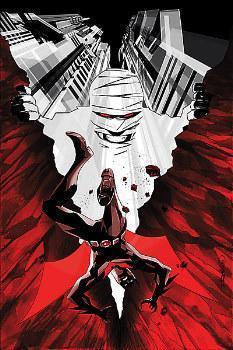 That having been said, if one is going to bring Grayson back, he should
serve a permanent, important purpose. Like, say, being a second mentor
to Terry, one who doesn't share the darkness in Bruce and help him keep
his sanity about him. Perhaps he could teach him how to hone his
physical skills with his gymnastics training. Of course, this would only
work if Grayson were true to character and remained a hopeful, generally
cheerful person. As it is, he sounds like he's two steps away from
becoming 'Miller'-verse Batman (especially with lines like 'I haven't
been OK since I was eight years old'). This character does nothing more
than show up, brood, save the city once and leave without making any
impact. It's entirely needless.
That having been said, if one is going to bring Grayson back, he should
serve a permanent, important purpose. Like, say, being a second mentor
to Terry, one who doesn't share the darkness in Bruce and help him keep
his sanity about him. Perhaps he could teach him how to hone his
physical skills with his gymnastics training. Of course, this would only
work if Grayson were true to character and remained a hopeful, generally
cheerful person. As it is, he sounds like he's two steps away from
becoming 'Miller'-verse Batman (especially with lines like 'I haven't
been OK since I was eight years old'). This character does nothing more
than show up, brood, save the city once and leave without making any
impact. It's entirely needless.Nor is Grayson the only one who gets the gratuitous once-over. Hush, a major enemy of Bruce, dies simply because he was in the wrong place at the wrong time, and is left in the street to die like some two-bit punk. Stalker, Mad Stan and possibly Shriek – all recurring and interesting (and liked!) Terry/Batman rogues are killed off screen by a villain no-one cares about. It really feels like there is an underlying attitude of contempt towards this world, kind of like Bruce's attitude towards Terry in the comic series.
Conclusion
If I were to sum up this series in a single phrase, it would be: missed opportunity. While it's by no means the worst story I've ever read or seen, it certainly provided the biggest disappointment. Ironically, the failure came mostly from 'playing it safe'. Batman Beyond is a world that broke free of the mold of the world of young Bruce Wayne. It created its own rules, characters and a sense of self-irony that does not come often in Batman's universe. However, it did so by taking risks, first and foremost by creating a new world almost from scratch and deliberately eschewing copying old Batman stories and villains (for the most part). Most of the time it worked, sometimes it didn't, but ultimately it succeeded.
By merely recycling RotJ and Epilogue and giving characters the 'Miller'-treatment, this series did more than just debase and cheapen the characters of this world. It did more than just leave us scratching our heads at the plot holes and gaffes. It betrayed its spirit and reason for being.
Bruce, Terry and especially Dick deserve much, much better than this. I can only hope the creators of this series realize that, and fast.